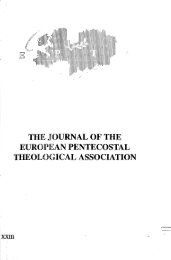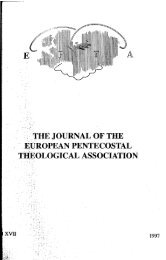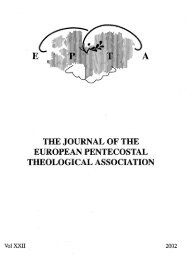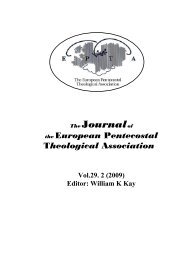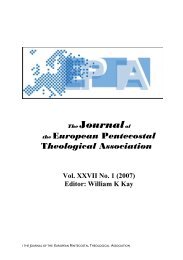jepta 2001 21 - European Pentecostal Theological Association
jepta 2001 21 - European Pentecostal Theological Association
jepta 2001 21 - European Pentecostal Theological Association
You also want an ePaper? Increase the reach of your titles
YUMPU automatically turns print PDFs into web optimized ePapers that Google loves.
The Journal of the <strong>European</strong> <strong>Pentecostal</strong> <strong>Theological</strong> <strong>Association</strong>, Vol. XXI, <strong>2001</strong><br />
Roman Catholic-<strong>Pentecostal</strong> Dia1ogue:Some <strong>Pentecostal</strong> Assumptions:<br />
Cecil M. Robeck, Jr.<br />
ASSUMPTION 4<br />
Any model of the church that, by definition, separates some people who<br />
claim that they are Christians from other people who claim that they are<br />
Christians is not an adequate model of the Church.<br />
Each of us is called to live a life worthy of our calling, marked by lowliness,<br />
meekness, patience, and forbearance in love, with a commitment to maintain the<br />
unity of the Spirit in the bond of peace (Ephesians 4:l-6). The question that<br />
needs to be asked is, "Is the institution known as the Roman Catholic Church part<br />
of the Church" To this question might be added another. What does it take to<br />
become a Christian If you ask this question, the first response that <strong>Pentecostal</strong>s<br />
generally give is an appeal to John 3:16. "For God so loved the world, that He<br />
gave His only begotten Son, that whosoever believeth in Him, should not perish,<br />
but have everlasting life." If you ask our pastors and most of our parishioners,<br />
"Are you sure that is what it takes to become a Christian' they will give you a<br />
clear and unequivocal response. "Yes!"<br />
The questions, then, must be asked, "Is that all it takes to become a Christian"<br />
What is the place of repentance in becoming a Christian What role, if any, does<br />
baptism play' What does it mean when we say, "whosoever believeth in Him"<br />
Does that really mean anyone "What is the nature of belief in Him Does one<br />
need to have a detailed Christology, Theology, or doctrine of the Trinity in order<br />
to express salvific belief Is belief the same as "faith," or more pointedly, does it<br />
mean the same thing as when we address ourselves to the Reformation statement<br />
concerning "justification by faith'And, 'Who is the 'Him' to which John 3:16<br />
refers"<br />
We might even press the question a bit further and ask whether the way we live<br />
when we claim the designation "Christian" for ourselves has any bearing upon<br />
whether we are, in fact, Christians. That is, are we really saved if we do not "lead<br />
a life worthy of the calling to which you have been called Should we be asking<br />
questions regarding how we engage in Christian ethics before we are satisfied<br />
that one has become a Christian If we listen carefully at most of our own altar<br />
calls, <strong>Pentecostal</strong> altar calls, we will find that none of these questions are being<br />
asked. We simply give the invitation. "If you want to become a Christian, come<br />
forward, acknowledge your need, and accept Jesus." It is that simple!<br />
' Cf. Acts 2:38. "Repent, and be baptized every one of you in the name of Jesus Christ for the<br />
forgiveness of your sins; and you shall receive the gift of the Holy Spirit." 1 suggest this text<br />
simply to demonstrate the roles that repentance and baptism appear to play in the thinking of the<br />
Apostles. The role of Baptism among <strong>Pentecostal</strong>s has been analyzed in Cecil M. Robeck, Jr.<br />
and Jerry L. Sandidge, "The Ecclesiology of Koinonia and Baptism: A <strong>Pentecostal</strong><br />
Perspective," Journal of Ecumenical Studies 27:3 (summer, 1990), 504-534.<br />
When we turn our attention to Roman Catholics, then, we need to ask the<br />
question of whether or not they are Christian, and if so, whether or not they are<br />
part of the Church. How are we to make these judgments Do they need to come<br />
to our altars in order for us to be satisfied with their confession Do they need to<br />
leave the Roman Catholic Church for us to be satisfied with their confession If<br />
they have not gone to the altar in the same way that we have, but they have been<br />
baptized, catechized, confirmed, they confess the creed, they participate in the<br />
Eucharist, and they say they are Christian, are we satisfied with their confession<br />
What must their confession look like Are we under any form of mandate to<br />
"maintain the unity. of the Spirit in the bond of peace" with these Roman<br />
Catholics Or do they need to be "charismatic" Catholics since we know that<br />
those who have been baptized in the Spirit must have also been "born again" and<br />
maybe even "sanctified" What is at stake here, and on what basis do we make<br />
the decisions that we make Why is it easy for us to accept a confessing Roman<br />
Catholic as a Christian, but it is not easy for us to accept the Roman Catholic<br />
Church as a genuine part of the Christian Church Why is it relatively easy for<br />
us to accept our <strong>Pentecostal</strong> denominations as genuine parts of the Christian<br />
Church when we know that there are people who frequent our churches who are<br />
not Christian, who are nominal Christians, or who are backslidden<br />
These questions lead us to others. Should we turn first to those who have had a<br />
bad experience at the hands of Roman Catholics or the Roman Catholic Church,<br />
who have been deprived of their livelihoods, stripped of their Bibles, been<br />
imprisoned, have been persecuted, even lost their lives at the hands of Roman<br />
Catholics in order to decide whether we should talk with the Roman Catholic<br />
Church Is this the appropriate place to begin and end any conversation<br />
regarding Roman Catholics Or do we turn to others for the answers to our<br />
questions Do we turn to those who understand the Roman Catholic Church and<br />
who have had only positive relations with it Is this the appropriate place to<br />
begin and end any conversation regarding Roman Catholics Is one group more<br />
privileged than the other, and if it were, why would this be the case<br />
It would be unfair if I did not note that there are many Roman Catholics who look<br />
at <strong>Pentecostal</strong>s as interlopers and proselytizers in their lands. Please, try to place<br />
yourself in their shoes. They have been present in places for 500 years or longer.<br />
They believe they have been charged with the spiritual care of the flocks in that<br />
region. Then along comes a <strong>Pentecostal</strong> who believes only the worst about them.<br />
This <strong>Pentecostal</strong> enters their "turf' without any invitation and begins to<br />
"evangelize" and "proselytize". [I want you to understand that I make a big<br />
distinction between these two terms]. This activity has an affect on long<br />
established churches. When the priest or bishop takes steps to stop the intrusion<br />
because no prior conversation has taken place, the "intruder" claims persecution.<br />
But where did the judgments begin, and how would we respond differently



